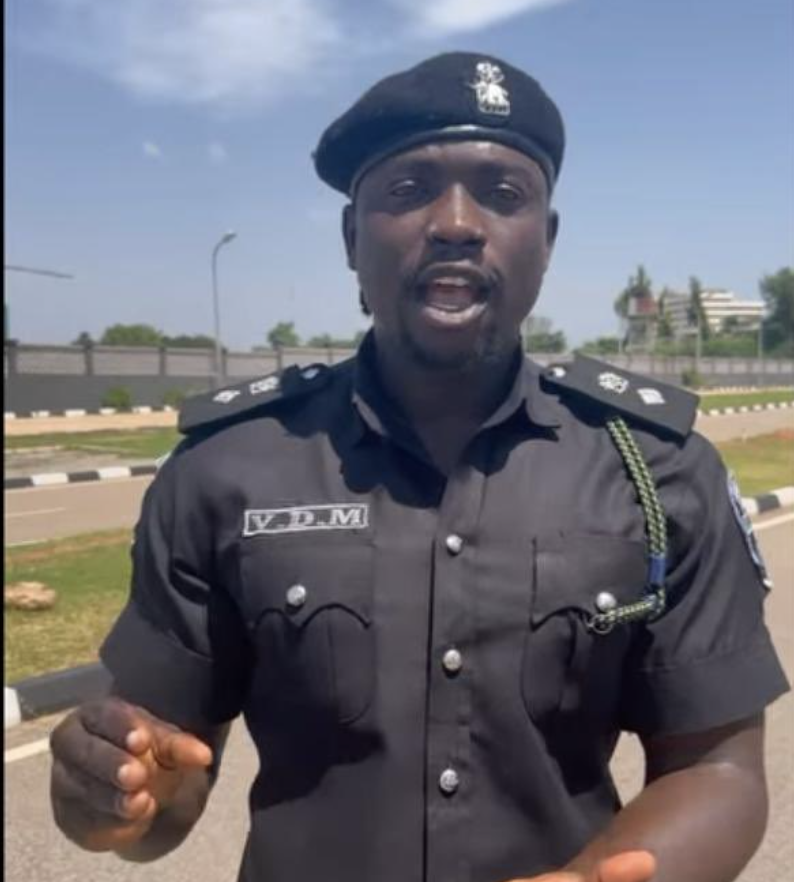
By DAYO ADESULU
Social Media Backlash and Legal Implications
Social critic Martins Otse, widely known as VeryDarkMan, has publicly apologized to the Nigeria Police Force after facing backlash for donning a police uniform in one of his recent videos. The incident sparked controversy and prompted the police to initiate an investigation into his unauthorized use of the uniform.
The Controversial Video
In the video that drew criticism, VeryDarkMan humorously introduced himself as a “Chief Superintendent of Police (CSP) of the Online Division,” while wearing attire resembling the official police uniform. His portrayal was intended as satire, but it quickly became a point of contention as the police condemned the act, emphasizing the seriousness of impersonating law enforcement.
Apology and Advice to the Public
In response to the backlash, VeryDarkMan released a video on Thursday, expressing his remorse for the situation. He clarified that it was never his intention to impersonate police officers and acknowledged the potential legal repercussions of his actions.
He stated:
“Back from the police station where I was interrogated based on the post I made wearing a costume that the police claim is similar to theirs. I didn’t intend to impersonate the police in any way and I tender my unreserved apologies to the Nigeria Police Force and the office of the Inspector General of Police.”
Furthermore, he advised the public to seek proper authorization before wearing police attire or any similar uniforms to avoid misunderstandings or legal issues. He emphasized the importance of obtaining permission, stating,
“You might want to use it for good but there are others that might want to use it for bad. So it’s good to get full approval before using anything that might seem impersonating.”
Legal Responsibility and Public Perception
The incident highlights the delicate balance between satire and legal boundaries, particularly concerning uniforms associated with law enforcement agencies. Impersonation of police officers is a serious offense in many jurisdictions, and the police’s swift response underscores their commitment to maintaining the integrity of their uniform and authority.
By apologizing and offering advice, VeryDarkMan aims to mitigate the situation while also educating his audience about the potential consequences of such actions. His acknowledgment of his lawyer’s support reflects the seriousness with which he is treating the matter.
VeryDarkMan’s experience serves as a cautionary tale about the implications of using law enforcement symbols for entertainment purposes. As social media continues to blur the lines between humor and legality, public figures must navigate these waters carefully to avoid misinterpretations and legal challenges. The incident also reinforces the need for respect toward law enforcement agencies and their symbols in the public domain.
The incident involving VeryDarkMan and the Nigeria Police Force is a significant example of the intersection between social media, satire, and the legal boundaries surrounding the representation of law enforcement. Here are some deeper insights and considerations regarding this situation:
Context of the Incident
- Social Media Influence: VeryDarkMan is known for his satirical commentary on social issues, often using humor to engage his audience. However, the blending of comedy with sensitive topics, such as law enforcement, can sometimes lead to unintended consequences. As social media platforms grow in influence, the responsibility of content creators to navigate these boundaries becomes increasingly crucial.
- Cultural Sensitivity: In many cultures, law enforcement symbols, including uniforms, carry significant weight and respect. The unauthorized use of such symbols can be perceived as disrespectful or as a trivialization of the serious nature of police work, especially in a country like Nigeria, where issues surrounding police conduct and public trust are already sensitive.
Legal Implications
- Impersonation Laws: In Nigeria, impersonating a police officer is a criminal offense. The law is designed to protect the integrity of law enforcement and prevent misuse of authority. VeryDarkMan’s situation highlights the potential legal repercussions of using police attire without proper authorization, even in a comedic context.
- Public Perception of Police: The police’s quick response to the incident reflects their commitment to maintaining public trust and authority. By addressing the issue promptly, they aim to reinforce the seriousness of impersonation and its potential consequences for public safety and order.
VeryDarkMan’s Apology
- Sincere Remorse: VeryDarkMan’s apology appears to be sincere, as he expresses regret for any misunderstanding that may have arisen from his video. His acknowledgment of the police’s position and his advice to the public indicate an understanding of the potential implications of his actions.
- Responsibility as a Public Figure: As a social critic and influencer, VeryDarkMan carries the responsibility of setting an example for his audience. His apology serves as a reminder of the need for public figures to consider the broader impact of their content, especially when it involves symbols of authority.
Broader Discussions
- Freedom of Expression vs. Legal Boundaries: This incident raises broader questions about the balance between freedom of expression and the legal limitations that exist to protect societal order. While satire and humor are important forms of expression, they must be exercised with an awareness of the potential consequences.
- Role of Law Enforcement in Social Media: The incident also illustrates the evolving role of law enforcement in the age of social media. Police forces worldwide are increasingly aware of their public image and the impact of social media on community relations. This situation may prompt discussions about how law enforcement engages with social media content and public figures.
Conclusion
The controversy surrounding VeryDarkMan and the Nigeria Police Force serves as an insightful case study on the complexities of modern communication, particularly in the realm of social media. As public figures continue to navigate the fine line between humor and respect for authority, incidents like this highlight the need for ongoing dialogue about the responsibilities of content creators and the implications of their work. It also underscores the importance of understanding the legal framework governing public expression, especially when it involves symbols of power and authority.